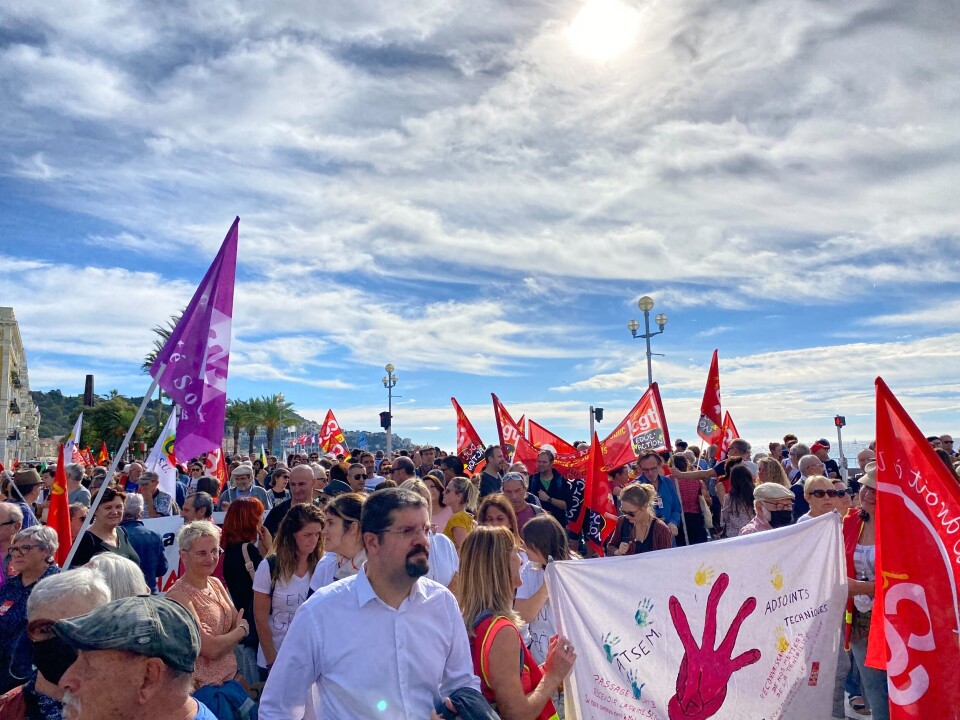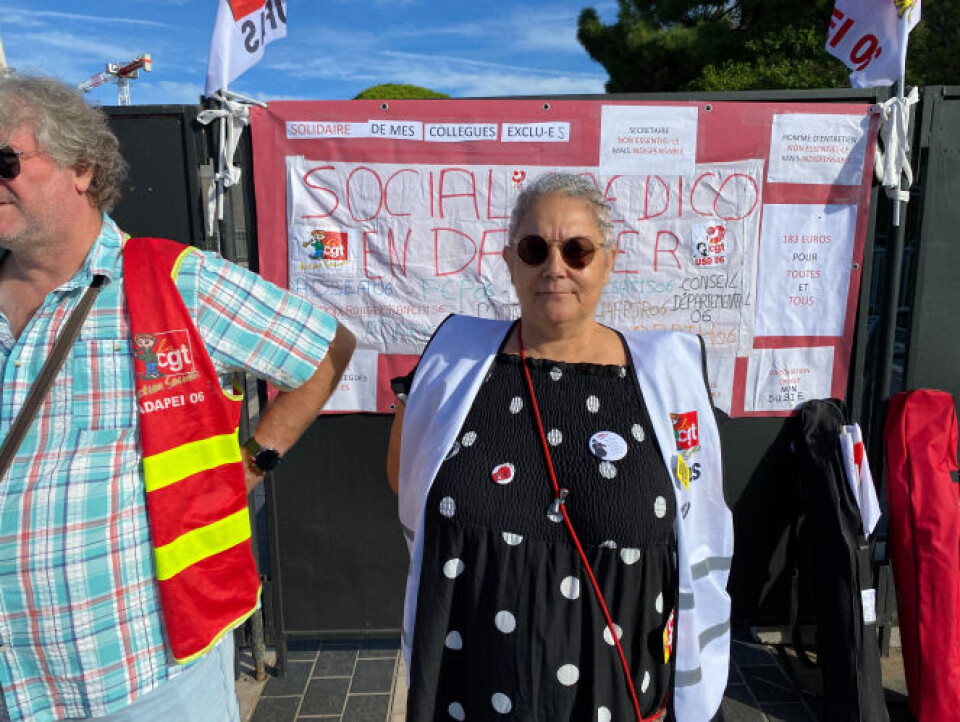-
French woman given one-year sentence for hiring men to evict squatter
Homeowner from south-west found guilty by Bordeaux criminal court
-
Drinking tap water restricted for children in south-west France communes
Haute Garonne prefecture says the measure is precautionary and due to high chlorate levels
-
‘Trustworthy’ media label idea from Macron causes political storm in France
Comments prompted fierce political backlash from right but government insists it was taken out of context
French workers explain why they joined today’s general strike
‘People have to live on €1,300 a month and are struggling.’ The Connexion speaks to protestors in Nice where one of around 200 demonstrations across France took place

Update September 30 at 11:00: The CGT has claimed more than 250,000 people participated in 200 protests across France on Thursday, September 29, while the Interior Ministry has said 118,500 people took part.
Workers across France took part in a general strike today (Thursday, September 29) to demand a pay rise and other protective measures against rising inflation and to denounce the government’s intention to raise the retirement age.
Various trade unions including the CGT, the FSU and Solidaires had called for the strike action, which caused disruption to trains, schools, ports and other public services.
At least 200 protests were expected to take place across the country.
Read more: Four questions about Thursday’s ‘spending power’ strikes in France
Read more: Reminder: What to expect from nationwide French strike
In Nice, several hundred protesters gathered at the Théâtre de Verdure this morning before marching down the Promenade des Anglais. The Connexion went to speak to some of them.
‘Our salaries are catastrophic’

Esther Tonna believes the child protection system is underfunded.
“I am here because we lack funding in the child protection system,” said Esther Tonna, 52, a union representative with the CGT.
“Our salaries are catastrophic. A child protection officer with an undergraduate degree starts on €1,300 a month.”
In February, the government announced a €183 pay rise for workers in the socio-educational field, but Ms Tonna said few people had actually received it.
Inflation has made the question of wages all the more pressing. “Our last pay rise was 2%, two years ago.”
As well as low salaries, she said there had been a “complete decline in working conditions”.
“The effect is that a child with a disability waits between one and three years to have a place in an institution. If a child is in danger, and we want to take them away from their family as they are being mistreated, we are unable to place them because there is no space.”
‘Working conditions are getting worse and worse’

Teacher Rose Marie Bongiovanni said her classes are too big.
Italian teacher Rose Marie Bongiovanni, 53, said her working conditions have also suffered from underfunding.
“I have classes with 30 pupils between the ages of 12 and 15. It’s not good to work with 30 students in modern foreign languages.
“I see it year on year, the quality of teaching my students receive is falling off. Even if I always try to get the best out of them, the conditions are getting worse and worse.”
She added: “Salaries are only increasing very slowly, and we are not certain to be able to retire any time soon.”
She said she was worried it would be even more of a struggle to relate to her students if she had to work until the age of 65.
During this year’s presidential election, Emmanuel Macron promised to raise the retirement age progressively from 62 to 65 by 2031, and to introduce a minimum pension of €1,100 per month.
The government has announced discussions will take place with MPs, workers and bosses, with the aim of putting forward a reform “by the end of the winter” which would take effect in the summer of 2023.
‘You wonder how people make it work’

Patrice Ciuti said he was defending the interests of pensioners like him as well as future generations.
“It’s essential to come together with regards to changes to the retirement age, and inflation which has caused a significant fall in salaries, pensions and benefits,” said Patrice Ciuti, 71, who used to work in the chemical industry.
The retiree, an activist for far-left party Lutte Ouvrière, accused big businesses and energy companies of profiting from the war in Ukraine.
“At the same time, the government is subsidising them because when it pays for petrol price freezes that money goes directly into Total’s pockets.”
He said he had personally noticed the effects of inflation. “When doing the shopping, you can buy almost nothing and end up paying €40 or €50. When you know there are people who earn €1,200, or €1,300, you wonder how they are able to make it work.”
Mr Ciuti said Lutte Ouvrière is demanding that salaries automatically rise in line with inflation, for work to be more evenly distributed among the population, and for large companies’ accounts to be made public.
“When they tell us they are in difficulty, we think they should show us their accounts. I think there would be a few surprises.”
‘Working three or four more years is enormous’
Lycée student Mathilde Girard, 17, decided to come to the protest when classes were cancelled as all of her teachers were on strike. She is already concerned about when she will be able to retire.
“Even working three or four more years is enormous,” she said. “I don’t think we should spend our entire lives earning a living.”
Her classmate, Franco-American Emelia Bennison, also 17, initially came to accompany her friend, but said she was keen to learn more about why people were striking.
“Americans have a tendency to think you need to work until you’re really old and get all that money, and they think people who don’t do that are lazy,” she said.
“It’s interesting because one part of my family is French and really into this stuff, and the American side of my family are Republicans, so it’s really different. Americans think French people are all communists.
“It’s interesting to learn more about the whole situation. I’m still discovering.”
14 schools closed in Nice

A placard seen in Nice shows a man cutting his TV wires as the Prime Minister warns of cuts (to the energy supply): “Let’s start right away!”
Thursday’s general strike caused disruption across a number of different industries. In Nice, 14 schools closed completely due to staff shortages, while 80 were partially closed.
While TGV Inoui trains were mostly unaffected, an average of one Intercité train in two was running on Thursday, and six in ten regional TER trains, with significant disparities between regions.
The CGT has called for ten measures to combat the effects of inflation - the cost of living was 5.9% higher in August than the previous year according to national statistics agency Insee.
Proposals include raising the minimum wage from €11.07 to €15 gross per hour, increasing pensions to a minimum of €2,000 gross per month, and lowering the VAT rate to 5.5% for basic necessities.
The CGT is also demanding equal pay for men and women, and for wages to reflect workers’ qualifications.
Solidaires has called for the minimum wage to be raised to €1,700, and the retirement age to be reduced to 60.
Related articles
French air traffic controllers call off three-day strike
Fears of fuel shortages are growing in France due to refinery strikes
























